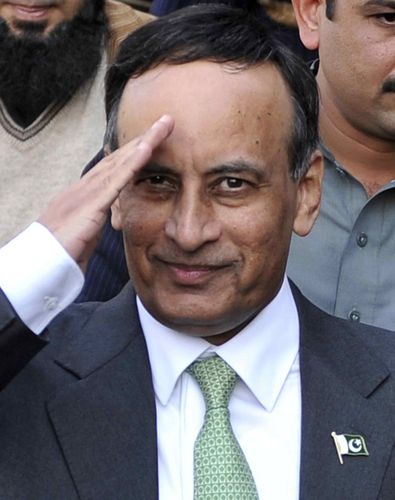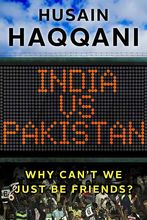
Interview/ Husain Haqqani, former Pakistan ambassador to the US
Husain Haqqani is no stranger to controversy. A former Pakistani diplomat, Haqqani is known for speaking out against the army for which he has been dubbed "anti-Pakistan". He lives in Washington, DC, in exile, aware that going back home could mean death, courtesy extremist groups. In his new book, India vs Pakistan: Why Can’t We Just be Friends?, Haqqani tries again to bring back nuance. “In both our countries, we have become victims of narratives where facts have become less important than narratives,” he asserts. The book is peppered with nuggets of information. One is about President Bill Clinton telling Nawaz Sharif in no uncertain tones to “retreat before disaster set in’’ in 1999. The US had “disturbing information about Pakistan preparing its nuclear arsenal for possible use.”
Clinton began the discussion by handing Sharif a cartoon from Chicago Tribune, which showed India and Pakistan as nuclear bombs fighting with each other. In the discussion that followed, Clinton asked Sharif to stop and at one point even threatened that he had a draft statement ready that would hold Pakistan responsible for Kargil. Haqqani’s book is available on the Juggernaut app and will be on bookshelves later this month. Excerpts from a telephonic interview:
The four-point formula for peace that was negotiated by Musharraf and Manmohan through official backchannels is much talked about. But you say that there were no details to be found in the foreign office in Pakistan when Musharraf fell in 2008. How is this possible?
There were negotiations and there was an agreement. But the change of the government was used as an opportunity to try and set back the agreement on the Pakistani side. Those who did not agree with the agreement in the Pakistani military and intelligence apparatus tried to put the clock back to the first point. This was not the first time. It is something that I can’t prove. But there is sufficient circumstantial evidence that somebody thinks it is much better to go back to zero each time. It is a game of snakes and ladders. I would say both countries have, what I would describe as, structures of conflict. Those who benefit from the structures of conflict simply do not want the conflict to end.
You talk about Shuja Pasha [ex ISI chief] saying to you that 26/11 was our people but not our operation. Then, how does that work?
I want to be very clear. I don’t think by our people he meant serving ISI officers. By our people, I think, he meant Pakistanis. And he meant that people had been trained and equipped in Pakistan and by LeT. He also admitted to the CIA, which is recorded in General [Michael] Hayden’s book, who was the head of the CIA, that some retired ISI and army officers were involved. But when he said it was not our operation what it meant was that it was not an officially sanctioned ISI operation.
You talk about non-state actors. How can Pakistan deal with them?
There is no doubt that General Raheel Sharif has taken steps that have never been taken before. He has tried to restore the credibility of the Pakistani military by going after corrupt officers in the army. He has also decided to go against extremist jihadi groups. But even he has had to spare the groups that are only directed against India.... Pakistan has to end extremism in its entirety.
How do you think India can help?
India needs to go beyond the official level to reach out to the people of Pakistan with both actions and words. It needs to end this ‘we are-enemies’ mindset. It is very easy to say Pakistan is our enemy. Maybe you need to make a distinction and say those in Pakistan who support jihadis are our enemies. Pakistan has 200 million people. And not all are jihadis.
After Narendra Modi went to Lahore, I believe you said that you were worried that something will happen. Then Pathankot happened. How do we get beyond this?
Your leaders and Pakistan’s leaders make the same mistakes. They don’t create the public opinion before engagement. [Mahatma] Gandhi wanted the relationship between people. And then your bureaucrats have made it relationship between bureaucrats. So, bureaucrats can meet and sign any agreement. Then others can poison it again.
Have things changed since Nawaz Sharif wrote that letter to [James] Baker in 1992?
The central argument is still the same. The Pakistanis are saying ‘you [the US] and we started the jihad against the Soviets together. So why are you judging us for continuing it’, which is what Nawaz Sharif says in his letter. The second part is that Kashmir is an issue and India is committing injustice against the Kashmiris, which somehow tries to legitimise our effort to try. The third is, we have groups operating from our soil but they are not controlled by the government or officially sanctioned. And the fourth argument is, if Kashmir is solved, then terrorism will end. You have seen variations of those arguments since 1992. And it has been 24 years. But if you think about it, the core argument has not changed.
The groups named in the letter have changed. But the core argument has not changed. There has been a consistency in Pakistani policy while there has been tremendous inconsistency in Indian policy.
You think that Indian policy is governed by who is ruling at the Centre?
India is unable to sustain dialogue that could lead to a solution and is unable to have consistent isolation which could also lead to a solution. So, one year of non-engagement is not enough to tell the other that you will suffer with non-engagement. You sometimes need to disengage for long periods of time for the other to deliver the message. Similarly, engagement has to be very sustained for a very long period of time for it to bear fruit.... This has become like a bad emotional relationship.... You either sustain the dialogue even if the other side is not going to change.... And then go to a marriage counsellor. Communication should be through a divorce lawyer.
Who will that be?
The international community will be the divorce lawyer. I don’t think divorce is an option. The international community has to come around and tell Pakistan that terrorism is not an option. And India has to reach out to the people of Pakistan more effectively than it has.
You write that each time an Indian leader talks about similarity, it is not about reassurance. It becomes more scary for Pakistani politicians. Do you think Indian leaders haven’t understood this?
If you have this argument in the country that the intention is to gobble us up, then the insistence on similarity plays into the hands of those who believe that. So, the solution to that is, act on the similarities; don’t talk about them.

Do you think Nawaz Sharif has the strength to pull off a better relationship?
I don’t think any civilian leader at this point has that strength. For any civilian leader to be able to take the great leap forward, he would have to be very popular. He would have to have credibility at home. He should have the authority to overrule the army. That civilian leader was Zulfikar Ali Bhutto. After that no other civilian leader has been very strong.
India vs Pakistan: Why Can’t We Just be Friends?
By Husain Haqqani
Price Rs 99 [when downloaded from the app]
Published by Juggernaut






